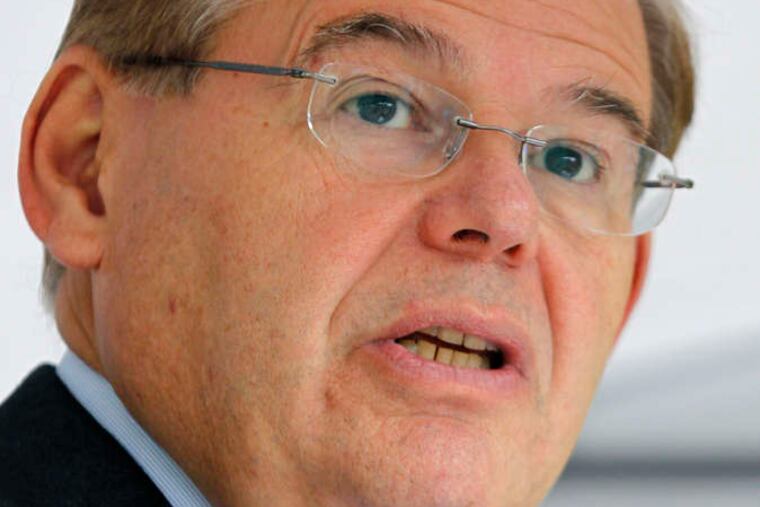Lawyers trade barbs over Menendez trial's location
The trial has not started yet, but lawyers are already baring their fangs in the fight between Sen. Robert Menendez and the federal prosecutors accusing him of accepting bribes.

The trial has not started yet, but lawyers are already baring their fangs in the fight between Sen. Robert Menendez and the federal prosecutors accusing him of accepting bribes.
In court filings debating where to hold the New Jersey Democrat's trial, prosecutors accuse Menendez of "seeking special treatment" by asking to move the case from Newark to Washington and trying to avoid his own constituents.
"Put simply," federal prosecutors wrote, "the Department of Justice is more confident than Senator Menendez that a New Jersey jury will objectively consider the evidence."
Menendez's team fired back that prosecutors seem more interested in "inflammatory rhetoric aimed at the senator's constituents and the media than actual legal argument."
Menendez's filings mock another of prosecutors' arguments - involving the senator's residency - as one "any sixth-grade civics student" would agree with, but one that is irrelevant to the legal question at hand.
Perhaps most sharply, Menendez's team, led by power lawyer Abbe Lowell, heavily cites the 2008 case against Sen. Ted Stevens (R., Alaska). The Justice Department, Menendez's lawyers note, insisted on trying Stevens in Washington, not his home state, but has taken the opposite stand with Menendez.
Along with bolstering Menendez's argument, citing Stevens also pokes at a lingering sore for the Justice Department's public corruption team. While Stevens was tried in Washington and convicted, Menendez's lawyers add with a jab, the charges "were ultimately dismissed due to egregious misconduct by the prosecutors."
The two legal teams are scheduled to come face-to-face again Tuesday in Newark for a hearing on where to hold the trial.
Prosecutors in April accused Menendez of accepting lavish gifts, including private flights and resort stays, from friend and donor Salomon Melgen, a South Florida eye doctor. In exchange, they allege, Menendez used his office to help Melgen in a $9 million Medicare billing fight and a business dispute, and when Melgen needed visas for far-flung girlfriends.
Menendez's lawyers argue that almost all of the alleged "official acts" on Melgen's behalf took place in Washington and that most of the witnesses - including many who work for the federal government - live or work in the capital. Holding a trial there, they add, would let Menendez continue his work representing New Jersey in the Senate.
The Washington courthouse, they say, is just a short walk from Menendez's Senate office.
Prosecutors argue for holding the trial in Newark, saying Menendez is a New Jersey resident who derived the power he allegedly abused from New Jersey voters.
And, the prosecution adds, "it is absurd to suggest" that a New Jersey senator wouldn't be able to do his job from inside the state. (The lawyers do not say how he might participate in Senate votes.)
Finally, even though many witnesses may be based in Washington, prosectors argue that Newark is easily accessible by train and plane and not that far from the capital.
The trial is to begin in October.
A spokeswoman said Menendez wants the trial in Washington so he can continue his work in the Senate - even though he might have an edge in New Jersey, because voters there recognize his work.
"The senator and his team firmly believe that he will be exonerated regardless of where the trial is held," spokeswoman Tricia Enright said.
With Menendez's career and freedom on the line, though, former prosecutors-turned-defense lawyers say the senator's lawyers would ask to move the trial only if they saw an advantage in Washington or a chance to minimize a disadvantage.
"Regardless of what they are putting forward in their brief, the issue here from a defense perspective is: They don't think they could get the fairest shake they could get in New Jersey," said Lee Vartan, a former federal prosecutor in New Jersey.
Two Menendez supporters, who spoke on condition of anonymity in order to discuss the case freely, worried that a New Jersey jury might feel more affronted by its senator's alleged misdeeds. Washingtonians, one said, might be "more agnostic."
Menendez's legal filings suggest as much.
Accusing prosecutors of stirring up "a circus" with media leaks, the defense team wrote that "it will obviously be easier to select a jury with fewer staunch supporters or detractors of the senator" in Washington.
Lawyers may also seek to move a case if they have worries about the past posture of a particular judge, said Scott Coffina, a Philadelphia defense lawyer and former federal prosecutor.
The Department of Justice, on the other hand, may see an advantage of its own in keeping the case in New Jersey rather than Florida, where Melgen lives and where the investigation began, or Washington, where the Stevens case came apart.
"The bench in Washington, D.C., may be more favorable [to Menendez], given the legacy of the Sen. Stevens case," said Adam Lurie, a defense lawyer who formerly tried corruption cases as a federal prosecutor in New Jersey.
Despite the sharp rhetoric, this particular fight probably won't have much influence on the outcome of the trial, said Robert Walker, a former trial lawyer in the Justice Department's public corruption unit.
But in a fight with these stakes, Menendez is going to try to find every angle he can to throw the government off its game, Walker said.
"Any advantage that the defense can get," he said, "or any disadvantage it can impose on the government, yeah, it makes sense to try to do that."